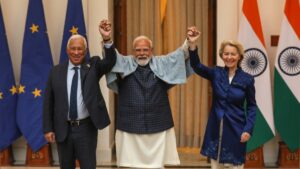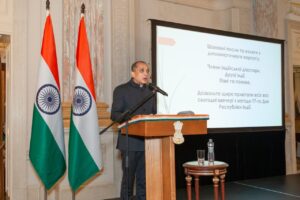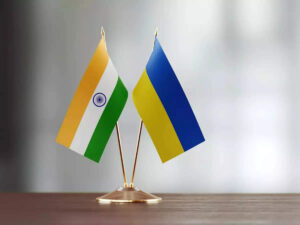
Indian oil refineries have begun to avoid new purchases of Russian oil for delivery in March-April amid talks between New Delhi and Washington on a trade agreement, which the parties hope to finalize by March, Reuters reports, citing traders and industry sources.
According to the agency, Indian Oil, Bharat Petroleum, and Reliance Industries are not accepting offers for Russian oil with shipments in March and April, although some refineries still have previously agreed deliveries for March. Reuters notes that most other refiners have also stopped new purchases from Russia.
At the same time, as Reuters emphasized earlier, Indian refineries have not received official instructions to stop importing Russian oil and, in the event of a policy change, would require a transition period to complete deals that are already in progress.
The context is the move by the US and India towards an interim trade agreement and the expectation of finalization in March. Against this backdrop, according to Reuters, the US has eased tariff pressure on India, and the American side has publicly linked this to New Delhi’s commitment to reduce purchases of Russian oil.
INDIA, OIL, refineries, RUSSIA

India and the European Union announced the conclusion of negotiations on a free trade agreement (FTA) following the summit in New Delhi.
According to the European Commission, trade liberalization will cover 99.3% for the EU and 96.6% for India (taking into account the partial liberalization of a number of items), with the EU eliminating tariffs on more than 90% of tariff lines and India on 86%.
The Indian side stated that the agreement provides access to the EU market for more than 99% of Indian exports in value terms, noting that the document will undergo legal review and final approval procedures.
According to EU profile materials, European agri-food exports will see a reduction in current high tariffs, including on alcoholic beverages—up to 30% for most wines, 40% for spirits, and 50% for beer. A number of Indian and industry sources also indicate that for certain categories, including passenger cars, tariffs may be reduced from 110% to 10% within an annual quota of up to 250,000 cars, and for premium wines – up to 20%.
EU-India trade in goods in 2024 amounted to around EUR 120 billion, with India being the EU’s ninth largest trading partner; for India, the EU is the largest trading partner in goods. The Indian Ministry of Commerce and Industry estimated bilateral trade in goods with the EU in the 2024-2025 financial year at $136.54 billion.
Source: https://expertsclub.eu/indiya-ta-yes-zavershyly-peregovory-shhodo-ugody-pro-zvt/
EU, FTA, INDIA, NEGOTIATIONS

India has reaffirmed its support for a comprehensive, just, and sustainable peace in Ukraine in accordance with international law and the UN Charter, including respect for territorial integrity and sovereignty, said the Indian Ambassador to Ukraine during a reception in Kyiv on the occasion of the 77th Republic Day of India.
Speaking in the presence of Ukrainian Deputy Foreign Minister Oleksandr Mishchenko, the ambassador noted that India supports “practical cooperation among all interested parties” and quoted Prime Minister Narendra Modi: “This is not an era of war.”

The ambassador also stressed that India remains one of Ukraine’s main trading partners despite the ongoing conflict and that Indian companies “will be happy to play a role in the restoration and reconstruction of Ukraine,” pointing to potential cooperation in the fields of digital public infrastructure, manufacturing, green energy, and new and promising technologies.
According to the speech, India will continue its humanitarian aid and plans to finance a $1.5 million project to modernize the surgical center of the Zbarazh Central Hospital in the Ternopil region as part of the High Impact Community Development Projects.

The ambassador also noted the growing interest in Indian culture and language in Ukraine and pointed out that the bilateral cultural cooperation program provides a framework for expanding exchanges, scholarships, and people-to-people contacts.
India recognized Ukraine’s independence on December 26, 1991. Diplomatic relations were established on January 17, 1992, and the Indian Embassy in Kyiv opened in May 1992. The Ukrainian Embassy in New Delhi was established in February 1993.
Republic Day is a national holiday in India, celebrated on January 26 to mark the coming into force of the Constitution in 1950, when India became a sovereign democratic republic. The date was chosen to commemorate the Indian National Congress’s proclamation of “Purna Swaraj” (complete self-rule) in 1930.

India imported $14.72 billion worth of gold in October 2025, according to data from the country’s Ministry of Commerce and Industry. This is three times more than in October last year, 1.5 times more than in September this year, and is set to be a historic record (last year, a slightly higher figure was reported in November, but it was later revised).
“The growth in gold imports in October was phenomenal, despite very high world prices,” said Indian Deputy Minister of Commerce and Industry Rajesh Agrawal, according to The Hindu. “The growth in silver was also phenomenal.” Silver imports increased 6.3 times, to $2.72 billion.
“The continuous rise in gold prices ahead of the festive season could have led to speculative demand, which may not be sustained in the future, possibly leading to some decline in imports in the coming months,” warns Aditi Nayar of Indian rating agency ICRA.
In just 10 months of 2025, India imported $50.74 billion worth of gold, up 17% from the same period last year (October’s results reversed the trend).
India is one of the world’s largest consumers of gold, producing virtually none itself.
Earlier, the Experts Club analytical center presented an analysis of the world’s leading gold-producing countries in its video on YouTube channel — https://youtube.com/shorts/DWbzJ1e2tJc?si=YuRnDiu7jtfUPBR9

Global demand for steel in 2025 will remain at the previous year’s level — about 1.748 billion tons, after a 1.6% decline in 2024. These figures are given in the short-term forecast of the World Steel Association (Worldsteel) — Short Range Outlook (SRO).
In 2026, according to experts, demand will grow by 1.3% to 1.772 billion tons, driven by recovery in Europe, India, and the rapidly developing countries of Asia, the Middle East, and Africa.
According to Worldsteel’s forecast, in the CIS countries, including Ukraine, demand for steel will decline by 5.2% in 2025, to 56.1 million tons, and by another 1.7% in 2026, to 55.2 million tons.
At the same time, India will retain its status as the world’s fastest-growing steel market, with growth of around 9% annually in 2025-2026. Already next year, steel consumption in India will be almost 75 million tons higher than in 2020.
In developing countries (excluding China), demand for steel will increase by 3.4% in 2025 and by 4.7% in 2026, driven by active economic development in ASEAN countries, as well as in Saudi Arabia and Egypt.
In Africa, steel consumption is growing by an average of 5.5% annually, reaching 41 million tons in 2025 — the highest level in the last decade. Growth is driven by investments in construction and improved macroeconomic indicators.
Andriy Ozeychuk, Chairman of the Board of Directors of the Ukrainian Steel Construction Center and Director of Rauta, commented on the market situation and prospects for the Ukrainian steel sector.
“The Ukrainian steel market in 2025–2026 will be shaped by the recovery of domestic demand in construction and machine building, as well as the growth of exports of metal structures to the EU. We predict that demand for steel in Ukraine may grow by 6-8% in 2026 due to infrastructure and industrial recovery projects,” Ozeychuk said.
According to him, the steel construction sector will be the driver of this growth:
“The use of metal structures will accelerate the restoration of logistics, industrial, and infrastructure facilities.”
Ozeychuk also stressed that the launch of joint programs with European partners in the field of “green” metallurgy, where Ukraine already has its first pilot initiatives for the production of steel with a low carbon footprint, could give the industry an additional boost.
According to the forecast, demand for steel in the EU+UK region will increase by 1.3% in 2025 and by 3.2% in 2026. This reflects the impact of increased investment in infrastructure and defense amid lower inflation and improved household incomes.
In the US, Worldsteel expects steel consumption to increase by 1.8% in both 2025 and 2026. The main drivers of growth will be government spending on infrastructure, a revival in housing construction, and private investment.
In China, steel demand will continue to decline, by approximately 2% in 2025, due to the prolonged downturn in the real estate market. In 2026, the rate of decline will slow to 1% as the construction sector is expected to bottom out.
Worldsteel warns that a more challenging global trade environment and financial pressure on local authorities could further limit infrastructure investment and reduce demand.
According to Alfonso Hidalgo de Calcerrada, chief economist of the Spanish Steel Manufacturers Association (UNESID) and chairman of the Worldsteel Economic Committee, the organization is “cautiously optimistic” about the market outlook:
“Despite trade disputes and uncertainty, we believe that global steel demand will bottom out in 2025 and show moderate growth in 2026,” the expert said.
He added that this will be facilitated by the resilience of the global economy, growth in infrastructure investment, and easing financial conditions. At the same time, the sector continues to be pressured by high costs, trade barriers, and geopolitical risks.
Worldsteel’s forecast emphasizes that the decline in demand in China is offset by strong growth in India and developing countries, where a new center of global steel production is emerging.
In addition, the protective measures introduced by the European Union — reducing duty-free import quotas and increasing customs duties to 50% — may change the balance between EU producers and exporters from Asia and Eastern Europe.
For more information on the largest steel producers and global industry trends, see the Experts Club video analysis review available on YouTube: Experts Club — Leaders of the global steel industry 1990–2024
CHINA, EU, EXPERTS CLUB, global economy, INDIA, OZEYCHUK, RAUTA, USA, World Steel, WORLDSTEEL


In August 2025, Ukrainians’ attitudes toward India were mostly neutral and partly negative. This is evidenced by the results of an all-Ukrainian sociological survey conducted by Active Group in cooperation with the Experts Club information and analytical center.
According to the results, only 16.0% of Ukrainian citizens demonstrated a positive attitude toward India (11.0% – mostly positive, 5.0% – completely positive). This country is negatively rated by 26.3% of respondents (20 . 7% – mostly negative, 5.7% – completely negative). At the same time, the vast majority – 55.3% – expressed a neutral attitude, and 2.7% said they did not have enough information.
“India remains one of the most important global players, but the country is not clearly defined in the public opinion of Ukrainians. This is influenced by both New Delhi’s political decisions in the international arena and limited cultural communication with Ukraine,” commented Maksym Urakin, founder of Experts Club.
He also drew attention to the economic dimension of bilateral relations:
“In the first half of 2025, the trade turnover between Ukraine and India amounted to more than $1.1 billion. At the same time, Ukrainian exports amounted to only $401.9 million, while imports from India exceeded $702 million. The negative balance of more than $300 million demonstrates a structural imbalance in trade,” Urakin emphasized.
In his turn, Active Group co-founder Oleksandr Poznyi added that these results indicate a cautious attitude of Ukrainians:
“Despite India’s economic weight and global status, the country remains remote and little understood for many Ukrainians. This explains the high level of neutral assessments and the low expression of positive emotions in society,” he emphasized.
The survey is part of a broader research program that analyzes international sympathies and antipathies of Ukrainians in the current geopolitical context.
The full video can be viewed here:
https://www.youtube.com/watch?v=YgC9TPnMoMI&t
You can subscribe to the Experts Club YouTube channel here:
https://www.youtube.com/@ExpertsClub
ACTIVE GROUP, DIPLOMACY, EXPERTS CLUB, INDIA, Poznyi, SOCIOLOGY, TRADE, URAKIN